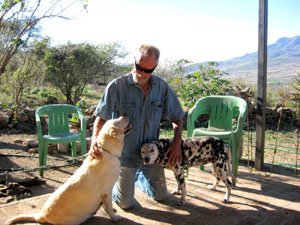Westwords

If man’s best friend is really a dog, Nick Lampiris is richly blessed. He has 37. Many colors, sizes and ages, pleasantly healthy, tails wagging, happy bounce to their steps.
Some were hungry orphans. Some were rescued from the streets, before or after contact. Some were rejects from weary owners. Some were handed off by vets stuck with unpaid bills. Three puppies were dropped on his doorstep. None are turned away.
Nick is too good-hearted for his own good. He spends far more on dog food than Nick food. His Social Security check never lasts an entire month.
My visit was well received. The official greeting was a chorus of tenor, alto and bass. Some dogs were just friendly. Some were frisky. They run and jump. Of course they bark, yip, yip, bow-wow, woof, woof. They do not disturb neighbors. There aren’t any.
Nick lives in Mexico, at the end of a mile-long dirt road, on ejido land, in the high country above Lake Chapala, in the colorful state of Jalisco. From his back door, he can see Mount Garcia and the lake, all the way to Scorpion Island. To the front is Mount Viejo. Wow!
In another life, Nicholas Lampiris was a Colorado geologist, the $150-an-hour expert consultant who helped guide the transformation of Aspen from a modest ski resort into a billionaire enclave.
Before that, he was schooled to be a college professor, University of Maryland, George Washington U., top graduate in doctoral studies at Virginia Tech. Just before he sat down behind a desk to call the roll, he faced up to a different point of view, a preference for a more adventurous lifestyle and open spaces where he could see the sky.
He chose Colorado. He loved the outdoors, hiking, fishing, hunting, skiing. Boots and jeans were standard attire. He loved animals and had five dogs and 10 horses. He played rugby with friends. He abhorred office hours.
Fifteen years ago, that same inclination brought him to Mexico.
“I retired too early,” says Nick, a young 68, lean, long, cropped beard, gray on top.
He has keen recall of why middle Mexico — near-perfect climate and modest value added for his $820 pension.
“I was going to find a pretty, young señorita and get married again. It almost happened. Three times.”
There’s a border snafu story from the beginning. He arrived within sight of Ciudad Juarez, in a pickup truck with camper shell and the five Colorado dogs in the back. He did not have proper documentation.
“Nothing to do but turn around and wait in El Paso for a friend to round up the paperwork and fax it to me.”
Nick and the dogs camped in the truck. Once cleared for crossing, Mexico was a snap.
“The customs attendant started to open the back and thought better of it.”
Nick Lampiris operated a furniture store in Jocotepec for eight years. Dock shakedowns at Manzanillo sometimes doubled Indonesian import costs. He finally gave up with a brief exit speech: “Just keep that blasted container. What you want in storage fees is more than the stuff is worth.”
He moved up the hill. He is building a home as many Mexicans do, bedroom first, then a few bricks or blocks at a time. If pesos are available, he adds on. It is slow. Kitchen and living room still have no roof — but he remains optimistic.
There is a mirador and hammock, the multi-million-dollar view and peace on Earth. Solar panels provide enough electricity to recharge the cell phone and operate a wireless Internet connection and a very few lights. He has no refrigerator. He brings in a cylinder of propane as needed. He catches and stores rainwater for the animals. He buys six big bags of dog food per week. The daily ration is 25 kilos. Money.
Nick co-owns a few acres with several thousand agave plants. He rents another plot so the four remaining horses have room to roam. Two cats have private quarters. Two turtles live in the big watering trough. Dog kennels are here and there, where shade is available. All dogs have names. Gremlin is absolutely irresistible.
A Dalmatian appears to be the queen. Her name is Manchas, “spots” in Spanish.
“She was vicious, or so the owner said. The family couldn’t do anything with her. They had a collar but could never get it fastened. They kept asking me to take her away.”
Nick Lampiris smiles as he tells of the day he walked through that front gate, patted the big, bad dog on the head and attached the red collar. The Dalmatian led her new friend back to the street.
People tell Nick he is nuts, that he should dispose of the dogs and live a better life. No way, he says, unless there is a flurry of adoption requests.
“It feels so good to be able to help where help is really needed.”
Nick could use some help. One elderly woman with a small pension surplus contributes each month. Lakeside Friends of the Animals has recently taken Nick under its umbrella.
Those who might find joy in feeding and caring for an animal (by proxy) can send a check payable to Nicholas Lampiris to the U.S. address of Busy Bees, 3618 Peck Street, Sarasota, Florida 34238.
Nick would undoubtedly respond with a souvenir photo — if he had a camera.
(Marvin West, mostly retired after just 42 years with Scripps Howard newspapers, is senior partner in an international communications consulting company. This column is from his forthcoming book, “Mexico? What you doing in Mexico?”
